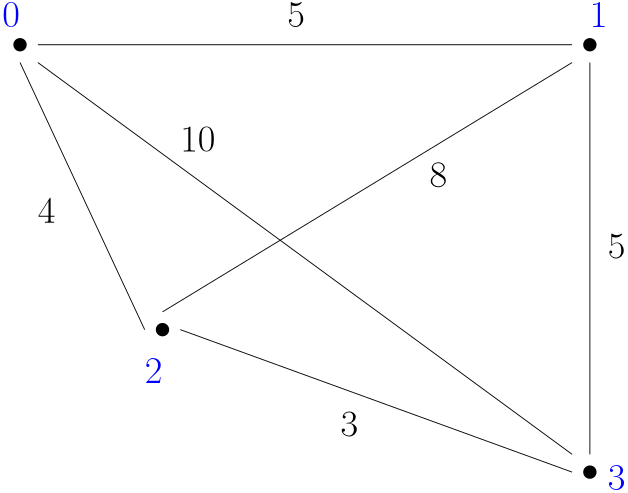Python TSP Solver
python-tsp is a library written in pure Python for solving typical Traveling
Salesperson Problems (TSP). It can work with symmetric and asymmetric versions.
Installation
pip install python-tspQuickstart
Regular TSP problem
Suppose we wish to find a Hamiltonian path with least cost for the following problem:
We can find an optimal path using a Dynamic Programming method with:
import numpy as np
from python_tsp.exact import solve_tsp_dynamic_programming
distance_matrix = np.array([
[0, 5, 4, 10],
[5, 0, 8, 5],
[4, 8, 0, 3],
[10, 5, 3, 0]
])
permutation, distance = solve_tsp_dynamic_programming(distance_matrix)The solution will be [0, 1, 3, 2], with total distance 17. Notice it is
always a closed path, so after node 2 we go back to 0.
There are also heuristic-based approaches to solve the same problem. For instance, to use a local search method:
from python_tsp.heuristics import solve_tsp_local_search
permutation, distance = solve_tsp_local_search(distance_matrix)In this case there is generally no guarantee of optimality, but in this small instance the answer is normally a permutation with total distance 17 as well (notice in this case there are many permutations with the same optimal distance).
Open TSP problem
If you opt for an open TSP version (it is not required to go back to the origin), just set all elements of the first column of the distance matrix to zero:
distance_matrix[:, 0] = 0
permutation, distance = solve_tsp_dynamic_programming(distance_matrix)and we obtain [0, 2, 3, 1], with distance 12. Notice that in
this case the distance matrix is actually asymmetric, and the methods here are
applicable as well.
Computing a distance matrix
The previous examples assumed you already had a distance matrix. If that is not the case, the distances module has prepared some functions to compute an Euclidean distance matrix, a Great Circle Distance, street distances (via OSRM) and support for TSPLIB-type files. Check the docs folder for some examples.
A more intricate example
Let us attempt to solve the a280.tsp TSPLIB file. It has 280 nodes, so an exact
approach may take too long. Hence, let us start with a Local Search (LS) solver:
from python_tsp.distances import tsplib_distance_matrix
from python_tsp.heuristics import solve_tsp_local_search, solve_tsp_simulated_annealing
# Get corresponding distance matrix
tsplib_file = "tests/tsplib_data/a280.tsp"
distance_matrix = tsplib_distance_matrix(tsplib_file)
# Solve with Local Search using default parameters
permutation, distance = solve_tsp_local_search(distance_matrix)
# distance: 3064When calling solve_tsp_local_search like this, we are starting with a
random permutation, using the 2-opt scheme as neighborhood, and running it until
a local optimum is obtained. It is the same as this:
permutation, distance = solve_tsp_local_search(
distance_matrix,
x0=None,
perturbation_scheme="two_opt",
max_processing_time=None,
log_file=None,
verbose=False,
)Each input variable is probably self-explanatory, but you can run
help solve_tsp_local_search for more information.
In my specific run, I obtained a permutation with total distance 3064. The actual best solution for this instance is 2579, so our solution has a 18.8% gap. Remember this solver is a heuristic, and thus it has no business in finding the actual optimum. Moreover, you can get different results trying distinct perturbation schemes and starting points.
Since the local search solver only obtains local minima, maybe we can get more lucky with a metaheuristic such as the Simulated Annealing (SA):
permutation2, distance2 = solve_tsp_simulated_annealing(distance_matrix)
# distance: 2830In my execution, I got a 2830 as distance, representing a 9.7% gap, a great
improvement over the local search. The SA input parameters are basically the
same as the LS, but you can check help solve_tsp_simulated_annealing for
more details as well.
If you are familiar with metaheuristics, you would know that the SA does not guarantee a local minimum, despite its solution being better than the LS in this case. Thus, maybe we can squeeze some improvement by running a local search starting with its returned solution:
permutation3, distance3 = solve_tsp_local_search(distance_matrix, x0=permutation2)
# distance: 2825So, that was o.k., nothing groundbreaking, but a nice combo to try in some situations. Nevertheless, if we change the perturbation scheme to, say, PS3:
permutation4, distance4 = solve_tsp_local_search(
distance_matrix, x0=permutation2, perturbation_scheme="ps3"
)
# distance: 2746and there we go, a distance of 2746 or a 6.5% gap of the optimum.
The PSX schemes work directly in the permutation space as shown in the figure below. Among these, the well-known 2-opt is very close to the PS5 and it works very well in most instances, but sometimes other schemes may yield better results because their neighborhoods are different.
In this case, PS3 and PS6 have larger neighborhood sizes, so we may get a better chance of improvement by switching to them in the LS step. Test other schemes and see if you can get different results.
Finally, if you don't feel like fine-tunning the solvers for each problem, a rule of thumb that worked relatively well for me is to run the SA with a 2-opt and follow it by a LS with PS3 or PS6, like
permutation, distance = solve_tsp_simulated_annealing(distance_matrix)
permutation2, distance2 = solve_tsp_local_search(
distance_matrix, x0=permutation, perturbation_scheme="ps3"
)Methods available
There are two types of solvers available:
| Exact: | Methods that always return the optimal solution of a problem. Use these solvers in relatively small instances (wherein "small" is relative to your requirements).
|
|---|---|
| Heuristics: | These methods have no guarantees of finding the best solution, but usually return a good enough candidate in a more reasonable time for larger problems.
|
For developers
The project uses Python Poetry to manage dependencies. Check the website for installation instructions, or simply install it with
pip install poetryAfter that, clone the repo and install dependencies with poetry install.
Here are the detailed steps that should be followed before making a pull request:
# Autopep8 and flake8 to be conformant with PEP8
poetry run autopep8 --recursive --aggressive --in-place .
poetry run flake8 . --count --select=E9,F63,F7,F82 --show-source --statistics
poetry run flake8 . --count --exit-zero --max-complexity=10 --max-line-length=79 --statistics
# Mypy for proper type hints
poetry run mypy --ignore-missing-imports .You can also run all of these steps at once with the check-up bash script:
./.scripts/checkup_scripts.sh
bash ./.scripts/checkup_scripts.sh # if the previous one failsFinally (and of course), make sure all tests pass and you get at least 95% of coverage:
poetry run pytest --cov=. --cov-report=term-missing --cov-fail-under=95 tests/Release Notes and Changelog
Releases 0.3.X
Release 0.3.1
Replace heuristic log messages with regular prints. The logs could be compromised with outer level configurations and start to pollute the stdout. Prints are easier to manipulate.
Add a
verboseparameter to heuristics to print execution messages in the stdout.Thanks for @FrickTobias for pointing this issue and providing a fix.
Python support: Python >= 3.7.1
Release 0.3.0
- Add support for street distance matrix calculation via an OSRM server.
Python support: Python >= 3.7.1
Releases 0.2.X
Release 0.2.1
- Improve TSLIB support by using the TSPLIB95 library .
Python support: Python >= 3.6
Release 0.2.0
- Add distance matrix support for TSPLIB files (symmetric and asymmetric instances);
- Add new neighborhood types for local search based methods: PS4, PS5, PS6 and 2-opt;
- Local Search and Simulated Annealing use 2-opt scheme as default;
- Both local search based methods now respect a maximum processing time if provided;
- The primitive print to display iterations information is replaced by a proper log.
Python support: Python >= 3.6
Releases 0.1.X
Release 0.1.2
- Local search and Simulated Annealing random solution now begins at root node 0 just like the exact methods.
Python support: Python >= 3.6
Release 0.1.1
- Improve Python versions support.
Python support: Python >= 3.6
Release 0.1.0
- Initial version. Support for the following solvers:
- Exact (Brute force and Dynamic Programming);
- Heuristics (Local Search and Simulated Annealing).
- The local search-based algorithms can be run with neighborhoods PS1, PS2 and PS3.
Python support: Python >= 3.8
Contributors
- @FrickTobias

